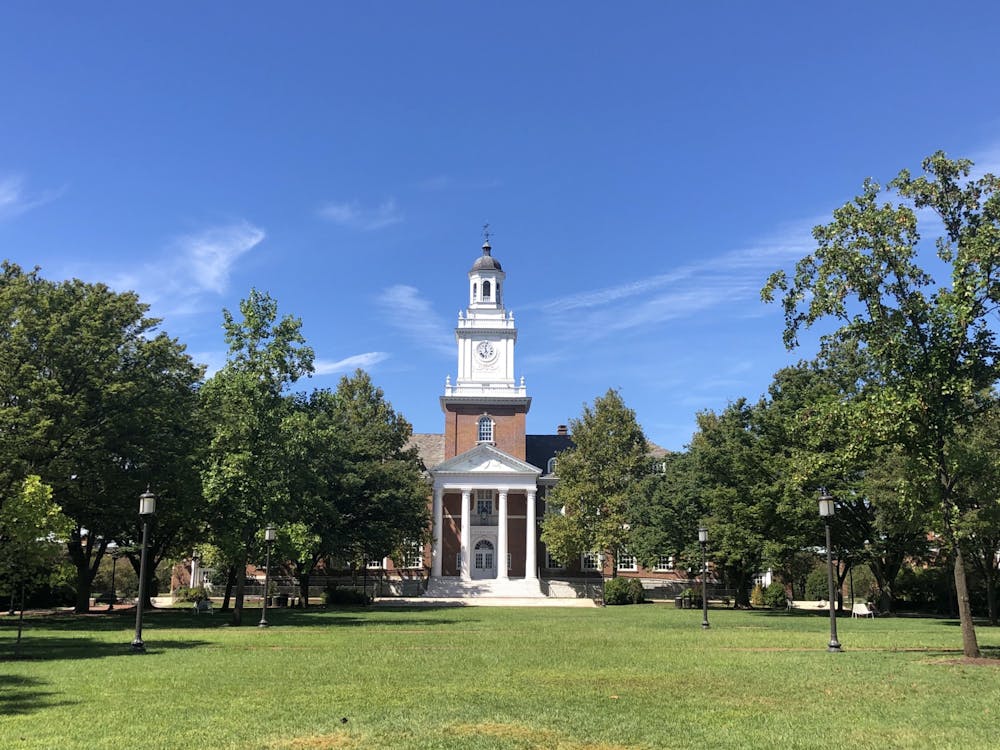University President Ronald J. Daniels and other administrators announced in an email to University affiliates today that Hopkins will open for increased in-person activities for Homewood undergraduates in the spring semester.
Hopkins will enter Phase Two of reopening, as laid out in a draft plan released three weeks ago. All undergraduate students will be required to be tested for COVID-19 twice a week beginning Jan. 11 and to use the Prodensity app daily before coming to campus. Face coverings must be worn at all times, and students are instructed to avoid large gatherings.
The Krieger School of Arts and Sciences and Whiting School of Engineering will offer 18% of their undergraduate courses in-person. Those classes will start online at the beginning of the semester but switch to in-person instruction on Feb. 2. Graduate schools and the Peabody Institute will communicate their respective plans for the spring, which may vary.
No students or faculty members will be required to be on campus, and the University will provide virtual alternatives for classes held in-person.
In an email to The News-Letter, Assistant Vice President of External Relations Karen Lancaster emphasized that while the University remains flexible, the one-week delay in resumption of in-person activities does not necessarily suggest an eventual switch to online-only operations.
“We have always been clear that we will change our plans if the public health situation requires it,” she wrote. “Our decision reflects the many steps we have taken since the fall to prevent the spread of the COVID virus among our community, not a prediction of what the state of the pandemic will be at the end of January.”
Undergraduate students will also be able to engage in in-person research starting Feb. 8.
Freshman Asha Shetler voiced her support for the decision. She explained that while her classes are all online, she plans to attend them in Baltimore in University housing.
“Being on campus makes studying for classes much easier and allows for better mental health, as students can have more of a social life as well, especially for freshmen who have not made many friends yet,” Shetler said. “I’m very excited to be on campus for the first time.”
The University has opened its housing facilities for undergraduate students. According to Lancaster, around 1,350 students — of which around 1,000 are freshmen — will be living in University housing in the spring.
Shetler believes that Hopkins has implemented the necessary measures to prevent a COVID-19 outbreak on campus.
“Hopkins has constructed a rather robust safety system against it,” she said. “The biggest thing I am concerned about is that, for people like me who have all of their classes online, it will still be hard to develop a social network despite being on campus.”
Sophomore Asimina Zoitou highlighted that students who return to campus must do their part in adhering to University protocols.
“The described public health measures are important and reflect an institution that is aware of the challenging public health situation we face today,“ she said. “The increased testing and the social distancing measures taken are essential for a safe transition. However, the responsibility of every individual to ensure safety is also important.”
While COVID-19 cases spiked nationwide following Thanksgiving, Daniels and other administrators stated that a similar increase in the number of positive cases did not materialize in the Baltimore area.
Baltimore has enacted various restrictions to contain the spread of COVID-19, notably suspending both indoor and outdoor dining starting Dec. 11 as the daily number of cases and deaths reached record levels.
Lancaster attributed the decision to the high risk of contagion that indoor dining carries. She noted that some forecasts projected post-Thanksgiving daily new case numbers to reach 5,000.
Daily new COVID-19 cases in Maryland have not exceeded a high of 3,796 and have been hovering between the high 2,000s and low 3,000s.
Zoitou, who is from Greece, stated that her initial plan was to return to the U.S. if the pandemic improved. However, she and her family are skeptical about whether she should return, given the surge in cases, and her plans are not yet set.
She called on the University to provide more resources for international students who remain unsure of their plans.
“As an international student, traveling during the pandemic is a worrying procedure and probably one of the factors that make me question if I can or should return on campus,” she said. “More information, recommendations for international students or more flexibility on the dates of the return on campus would greatly facilitate students to make a decision for their spring semester plans.”
Sophomore Susan Liu, who is from China, also expressed her doubts about returning to the United States.
“Realistically, going to the U.S. now does not seem to be the prudent decision. I actually have to be quarantined in another country before flying there,” she said. “The school could have done better with providing resources for international students. One big thing is I know a lot of schools provided international Go-Local options, but when we talked to Hopkins about it to set a program, the school just wasn’t willing to do that.”
In their email, administrators cited the successes of peer institutions in carrying out a hybrid reopening last semester. They also stressed that transmission was low at Hopkins this fall, even in the context of limited in-person lab research.
“We know that thousands of our students were in Baltimore during the fall semester and will be here in the spring regardless of our operating posture and have thus far avoided any significant outbreaks due to their diligence in following COVID safety practices in their daily lives,” they wrote.
The University will be asking students and affiliates to affirm their commitment to act responsibly and prevent the spread of COVID-19 by acknowledging the Social Compact, a document that will be launched in the coming weeks.





